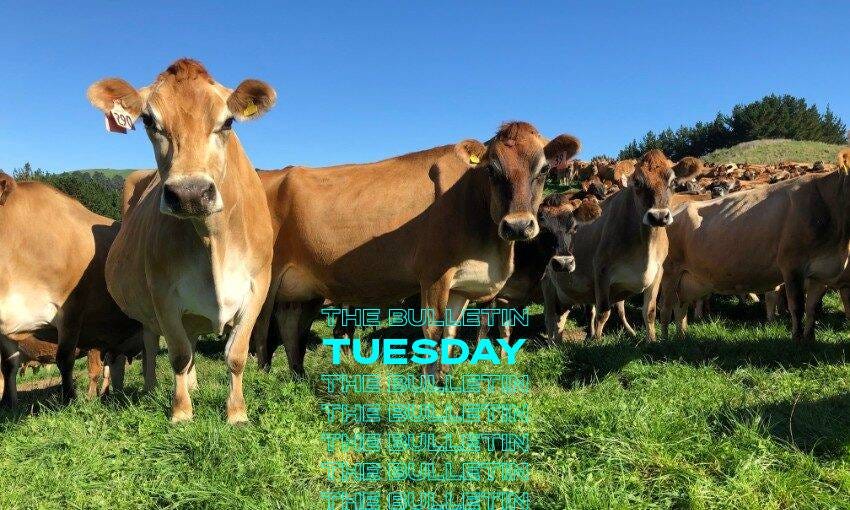Two options to cut farm emissions
The debate is on to cut New Zealand's on-farm emissions, but the climate change minister doesn’t seem happy with either proposal
Mōrena and welcome to The Bulletin for Tuesday, February 1, by Justin Giovannetti. Presented in partnership with Z Energy.
In today’s edition: Duelling statements over MIQ request; most of NZ wants house prices to fall; Raglan’s airfield blocked by protest; but first, a plan to combat the country’s agricultural emissions.
Do you tax these cows’ emissions or do you tax what they produce? (Southern Pasture)
New Zealand’s farmers have been presented with two options to cut agricultural emissions before a 2025 deadline. Farming is the country’s highest emitting sector and unlike other industries, it doesn’t fall under the emissions trading scheme. Instead, He Waka Eke Noa, a partnership of government officials and the main groups representing New Zealand agriculture, has been working to come up with a different approach. They’ve now sent two proposals to farmers. As Stuff reports, both options are based on funding new technology and providing farmers with incentives to cut emissions. Climate change minister James Shaw has shown some reluctance about the proposals, with would cut less than 1% of emissions by 2030. Shaw said he wanted a “serious price signal” that would fuel significant change.
What’s being proposed? One of the options would be a levy on the emissions of individual farms. It would be more expensive to administer, but would recognise farmers who have done more to cut emissions. The other would be a processor levy, paid on products bought from farms. The second option would be cheaper, but wouldn’t differentiate on the actual emissions each farm produces. Olivia Wannan has broken down the options for Stuff. While Shaw is keen on a substantial price for emissions, Farmers Weekly reports that many in the industry say a carrot works better than a stick. They want to see more of a focus on innovation and avoiding emissions, rather than taxing those that are created.
There’s technically a third option: the carbon market. If the agricultural industry can’t agree on a plan that the government wants to adopt, all the country’s farms could be made to buy credits on the country’s carbon market. It’s a nuclear option and would be far more expensive than what’s proposed. Consultations are starting soon on the two options and farmers have until April, when their preferred plan needs to go to government. A number of farmers told RNZ that they aren’t keen on either option and they’ll go to local debates to share their thoughts. They’d like to see on-farm emissions completely removed from the country’s climate programme, but they understand that won’t happen.
The government has vowed a tough climate plan will come out this year. Tackling agriculture is just one part of the programme to finally control New Zealand’s increasing emissions. Shaw and the prime minister have said it’ll be a focus this year. However, this is difficult work and our track-record is spotty. Aided by declassified documents, Ben Strang wrote in Stuff about how previous governments thought they were on top of emissions. In 1994, officials expected emissions to drop by half at the end of the decade. The then environment minister mused about negative emissions by 2000, due to all the carbon sucked up by forests. Instead, emissions rose from negative 2.8 million tonnes to positive 3.85 million in 2000. They’ve nearly tripled since then.
Omicron means that, yet again, we at The Spinoff will be devoting significant resources to covering this enormous and complex story. If you value what we do, please consider becoming a member today. Every dollar donated is ring-fenced to support our journalism, and right now we need audience support more than ever.
Is your organisation keen to support The Spinoff? We would love to hear from you—contact us today to find out more about our organisation memberships.
Criticism mounts as Charlotte Bellis and the Covid-19 minister trade statements. Facing increasing pressure, Covid-19 minister Chris Hipkins released a public statement yesterday that there is always place in managed-isolation for people like Charlotte Bellis, a pregnant New Zealander stranded in Afghanistan. She’s now been asked to reapply under a different category. As the NZ Herald reports, Bellis called his statement “outrageous” after figures show only 13% of emergency applications involving pregnancy have been approved. However, the minister stressed that she really should apply again, so it seems likely her second attempt to secure a spot in MIQ will be successful.
A lawyer who has represented a number of people seeking emergency MIQ spots said they often only get approved after legal or media attention. A woman who told the NZ Herald over the weekend that she watched her mother die via video-link after her failed MIQ application is now on her way to Ireland after officials gave her request a second look and signed off.
An estimated 2,500 of 4,500 MIQ rooms are currently occupied. The totals are approximate as the government stopped sharing most MIQ data in November.
The Spinoff’s Covid data tracker has the latest figures.
National is looking to former British PM David Cameron’s Conservatives for advice. The opposition party’s retreat in Queenstown started with a video chat from Cameron’s finance minister, George Osborne. The former prime minister was supposed to appear, but tested positive for Covid-19. As RNZ reports, the message of the retreat to MPs was to stay on topic, nail their portfolios and meet with constituents. Newsroom looked at backbencher Harete Hipango, who failed at all three. She caused troubles for leader Christopher Luxon over the summer by appearing with anti-vaccination protesters, twice, and then asking her staff to edit her Wikipedia entry to remove mention of the incidents. Asked by media about the edits, Hipango said she’d investigate what happened, only to return several hours later to admit that she’d done it.
On the UK’s Conservatives, a much anticipated report into the current prime minister’s lockdown breaches has been released. Sue Gray, a senior civil servant, concluded there were “serious failures of leadership” throughout the government as alcohol-fuelled parties raged at prime minister Boris Johnson’s residence and office during strict Covid-19 lockdown. According to Reuters, a seperate police investigation is now underway into the rule breaches. Facing calls to resign, Johnson apologised to parliament and vowed to fix the situation.
Three-quarters of New Zealand wants house prices to fall: poll. One News reports on a poll that also finds about half the country would also be happy if prices “fell by a lot.” The amount isn’t defined. Labour and National both said in response to the poll that most people now expect prices to drop this year from record highs. No new work programme is expected to facilitate that fall. The Greens say their partner in government needs to do a lot more.
To illustrate the current state of the housing market, Breakfast took viewers on a tour of a $220 per week sleep-out in Wellington. The tenant renting the shed, which only has room for a bed and a chest of drawers, said they were “stoked” after they unsuccessfully applied to rent 55 other properties. The shed doesn’t have a toilet, shower or running water.
A group has occupied Raglan’s airfield after a dispute over a fence. The Waikato Times reports that locals have wheeled a dilapidated vehicle onto the grass strip after the local council erected a fence around the airfield. There had been a small protest every Sunday for the last three months before Monday’s escalation. Protesters want the fence removed because they say it impedes access to a nearby beach and there’s no need for it. Council says some protesters, who want the airfield closed completely, started playing chicken with landing planes so they really had to install the fence.
Got some feedback about The Bulletin, or anything in the news?
Get in touch with me at thebulletin@thespinoff.co.nz
Right now on The Spinoff: Mirjam Guesgen looks at what the next variant of Covid-19 might look like. Reweti Kohere reports on what NZ designers think of a trend towards fashion rentals. Justin Latif asks if it’s time for council to throw South Auckland a little bit of shade? Charlotte Muru-Lanning gets into why every workplace should have a health and safety rep. Anahera Gildea explains why Imagining Decolonisation is still a best-seller after two years.
Lydia Ko wins in Florida, as New Zealand golfer looks to become top in world again. The NZ Herald (paywalled) reports that Ko’s rivals should be worried after she’s made changes to her game, dropping a pursuit of perfection for a more practical approach. Her victory in Florida, the 17th of her career, was sealed by a sensational short game that overcame some scrambling on the greens.






